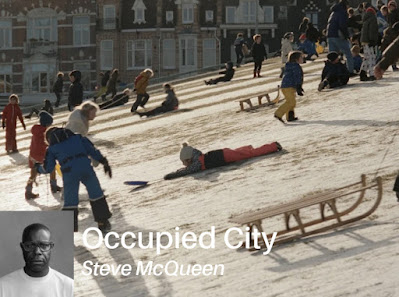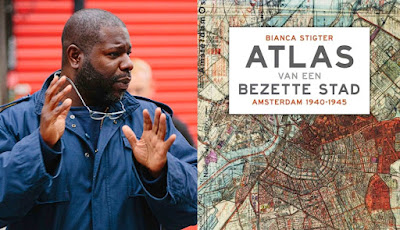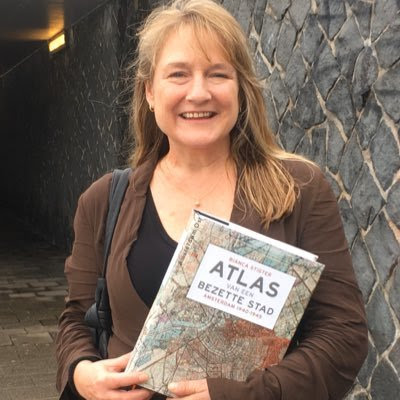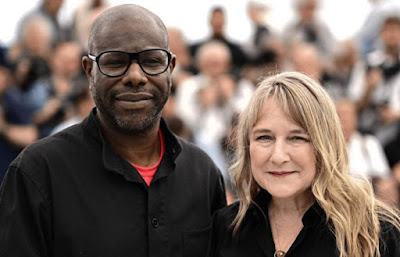Cannes to Holland: As Abq Jew has mentioned (see April's Hiding During the Holocaust), over the past few weeks he has become fixated on the travails of Dutch Jews during World War II.
A major part of Abq Jew's fixation is due to the overwhelming tragedy, which Nina Siegal shared in her recent book The Diary Keepers:
- Of the estimated 140,000 Dutch Jews, only about 35,000 survived World War II. Some 102,000, along with hundreds of Roma and Sinti people, died in the Holocaust.
- That means that about 75 percent of the Dutch Jewish population was murdered in five years.
- In a single generation, the Nazis had managed to wipe out four centuries of Jewish tradition and culture in Amsterdam and the Netherlands
- In France, 25 percent of Jews were killed during the Holocaust; about 40 percent of Jews from Belgium were murdered.
- The Netherlands holds the dubious distinction of having the lowest survival rate of all the Western European countries.
As it turns out - it's strange, sometimes, how these things turn out - during Covid, famed British filmmaker and director Sir Steve Rodney McQueen (the Academy Award-winning 12 Years a Slave, et al) was working on a documentary about just that sad topic.
As it also turns out - not so strange, this time - famed British author and director Bianca Stigter, Dame McQueen, wrote an illustrated history in 2019 titled Atlas van een bezette stad: Amsterdam 1940-1945 (Atlas of an Occupied City: Amsterdam 1940-1945).
The book uncovers traces of World War II in Amsterdam, guiding the reader through the once-occupied Netherlands capital. (There does not appear to be an English translation ... yet.)
Where were people in hiding? Where was the NSB headquarters? Where were Het Parool and Vrij Nederland stenciled and where were the food stamps distributed? In which street was an attack committed and which house was set on fire as a reprisal?
The resulting film, Occupied City, premiered
at the 2023 Cannes Film Festival on May 17, 2023.
The Netherlands Film Fund says:
Living in Amsterdam is like living with spirits.
It looks like there are two parallel worlds.
The past is always present.
The Cannes website tells us:
The past collides with our precarious present in Steve McQueen’s bravura documentary Occupied City, informed by the book Atlas of an Occupied City (Amsterdam 1940-1945) written by Bianca Stigter.
McQueen creates two interlocking portraits: a door-to-door excavation of the Nazi occupation that still haunts his adopted city, and a vivid journey through the last years of pandemic and protest.
What emerges is both devastating and life-affirming, an expansive meditation on memory, time, and where we’re headed.
‘Occupied City’: Steve McQueen Breaks With Doc Convention in a Provocative Look at Amsterdam During World War IIWorking from a book by his wife, Dutch filmmaker Bianca Stigter, the '12 Years a Slave' helmer explores his adopted city in the ’40s and today.It’s no surprise that Steve McQueen, a visual artist turned director, takes an unorthodox approach to nonfiction. Without a single interview or frame of archival material, he connects past and present in Occupied City, a documentary that challenges and rewards patience.
Combining an elegantly lensed visual portrait of contemporary Amsterdam with a matter-of-fact oral account of the city during its occupation by Germany, McQueen’s four-plus-hour film shares the exhaustiveness of such Holocaust-chronicle magnum opuses as Max Ophuls’ The Sorrow and the Pity and Claude Lanzmann’s Shoah.
But its perspective is entirely fresh, eschewing the standard, and more readily engrossing, nonfiction custom of first-person testimony and faces in dramatic close-up. Peering into the liminal place where history’s ghosts linger, McQueen stirs up something more complex than emotion.
In Steve McQueen's 4-hour Cannes entry 'Occupied City,' Holocaust past meets Amsterdam present
In Steve McQueen's “Occupied City,” a young woman with an even voice narrates, with rigorous specificity, Nazi encounters and crimes throughout Amsterdam during World War II. The accounts go address by address, and so does McQueen's camera.Yet the images that play throughout "Occupied City" are of modern day Amsterdam. In the roving, 4 hour-plus documentary made by McQueen, the “12 Years a Slave” director, with his partner, the Dutch documentarian and author Bianca Stigter, past and present are fused — or at least provocatively juxtaposed.The effect can be startling, stirring and confounding. An elderly woman shifts to country music in an apartment complex where, we're told, a family was once arrested and sent to a concentration camp. A radio throbs with Bob Marley in a park where German officer once resided in the surrounding townhouses. A boy plays a virtual reality videogame where an execution took place.
McQueen said in an interview alongside Stigter
It’s almost like once upon a timethere was this place called Earth.
“Occupied City,” which premiered Wednesday at the Cannes Film Festival, includes no archival footage or talking heads. Instead, it invites the viewer to consider the sometimes hard-to-fathom distance between one of history's darkest chapters and now. It's about remembering and forgetting.
‘Occupied City’: Steve McQueen’s Epic Holocaust Documentary Is a Disquieting Cinematic EssayWe walk among ghosts in cities, storied urban constructs with layers of misty memories one can sense in their distinct smells, and perceive in their dated cracks and imperfections.
There are hundreds of thousands of such ghosts that haunt Steve McQueen’s audacious documentary essay “Occupied City,” a 2023 Cannes premiere that is as much a hypnotizing and cumulatively disquieting cinematic artifact about the Holocaust and World War II-era Amsterdam as it is a stubbornly single-minded historical art installation.The simplest way to describe “Occupied City” would be calling it an extensive guided tour of Amsterdam’s past that uses Bianca Stigter’s book, “Atlas of an Occupied City (Amsterdam 1940-1945)” as a compass.
McQueen’s camera travels through 130 specific addresses in the present-day of his adopted town.
Let’s call it near-present-day to be exact — “Occupied City” strolls through the Dutch capital mostly during the earliest days of the COVID lockdown, introducing each of these addresses as they relate both to their gut-wrenching World War II history and contemporary standing.Door after door, town square after town square, hall after hall and lot after lot where some of the now knocked-down buildings used to exist, Stigter’s strong diction and disaffected voice narrates what took place in those locations in the years of the fascist occupation by Germany, after Nazi troops invaded the Netherlands to eliminate its Jewish, Sinti and Roma populations.
Occupied City – Steve McQueen’s moving meditation on wartime AmsterdamThe monumental film which tracks day-to-day life in Amsterdam under Nazi rule asks hard questions of what we think about the gulf between past and presentSteve McQueen’s monumental film is a vast survey-meditation on the wartime history and psychogeography of his adopted city: Amsterdam, based on his wife Bianca Stigter’s Dutch-language book Atlas of an Occupied City, Amsterdam 1940-1945.With a calm and undemonstrative narrative voiceover from Melanie Hyams, the film tracks day-to-day life in Amsterdam under Nazi rule.
It spans the invasion in 1940; the establishment of the NSB, the collaborationist Dutch Nazi party; the increasingly brutal repression and deportation of Jewish populations to the death camps; and then the “hunger winter” of 1944 to 1945 as food and fuel became scarce in the city and the Nazis displayed a gruesome mix of panic and fanaticism as the allies closed in.What McQueen does is effectively represent the maps and figure legends of the book on screen: the camera shows us the modern-day indoor and outdoor scenes on individual streets, canals, squares, buildings and jetties where the barbarity unfolded – but shows them as they are now, with 21st-century people going about their business while Hyams’ narration coolly summarises what happened in each particular spot, sometimes adding that the original building has been “demolished”.
Occupied City ends with a sobering touch as the camera lies still on an empty tram as it travels through the fog-filled city, the empty train symbolises the emptiness left behind by all the murdered victims of an oppressive regime: those seats, now empty, could’ve been occupied.
It then concludes with a bar mitzvah, showcasing the next generation of Jewish people from Amsterdam.
It’s as if he is trying to say: there is a future out there, but it’s also important to look at the past to avoid the same heinous results.














1 comment:
Interesting & informative!
Post a Comment